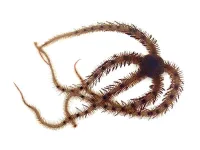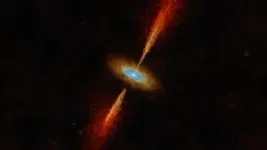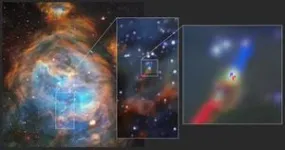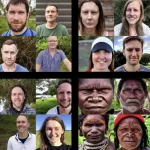(Press-News.org) DURHAM, N.C. -- We humans are fixated on big brains as a proxy for smarts. But headless animals called brittle stars have no brains at all and still manage to learn through experience, new research reveals.
Relatives of starfish, brittle stars spend most of their time hiding under rocks and crevices in the ocean or burrowing in the sand.
These shy marine creatures have no brain to speak of -- just nerve cords running down each of their five wiggly arms, which join to form a nerve ring near their mouth.
“There's no processing center,” said lead author Julia Notar, who did the research as part of her biology Ph.D. in professor Sönke Johnsen’s lab at Duke University.
“Each of the nerve cords can act independently,” Notar said. “It’s like instead of a boss, there's a committee.”
In the case of brittle stars, that seems to be enough to learn by association, Notar, Johnsen and former Duke undergraduate Madeline Go report in the journal Behavioral Ecology and Sociobiology.
This type of learning involves associating different stimuli via a process called classical conditioning. A famous example is Pavlov’s dog experiments, which showed that dogs repeatedly fed at the ringing of a bell would eventually start drooling at the mere sound of a bell, even when no food was around.
Humans do this all the time. If you hear the “ding” of a smartphone over and over again with each new alert, eventually the sound starts to have a special meaning. Just hearing someone’s phone ping or buzz with the same chime as yours is enough to make you reflexively reach for your own phone in anticipation of the next text, email, or Instagram post.
Classical conditioning has been demonstrated in a handful of previous studies in starfish. But most echinoderms -- a group of some 7,000 species that includes brittle stars and similarly brainless starfish, sea urchins and sea cucumbers -- have not been tested.
To find out if brittle stars are capable of learning, the researchers put 16 black brittle stars (Ophiocoma echinata) in individual water tanks and used a video camera to record their behavior.
Half the brittle stars were trained by dimming the lights for 30 minutes whenever the animals were fed. Every time the lights went out, the researchers would put a morsel of shrimp -- “which they love” -- in the tanks, placed just out of reach.
The other half got just as much shrimp and also experienced a 30-minute dark period, but never at the same time -- the animals were fed under lit conditions.
Whether it was light or dark, the animals spent most of their time hiding behind the filters in their tanks; only coming out at mealtime. But only the trained brittle stars learned to associate darkness with food.
Early in the 10-month-long experiment, the animals stayed hidden when the lights went out. But over time, the animals made such a connection between the darkness and mealtime that they reacted as if food was on its way and crept out of hiding whenever the lights went out, even before any food was put in the tanks.
These brittle stars had learned a new association: lights out meant that food was likely to show up. They didn't need to smell or taste the shrimp to react. Just sensing the lights go dim was enough to make them come when called for dinner.
They still remembered the lesson even after a 13-day ‘break’ without training, i.e., dimming the lights over and over again without feeding them.
Notar said the results are “exciting” because “classical conditioning hasn't really been shown definitively in this group of animals before.”
“Knowing that brittle stars can learn means they’re not just robotic scavengers like little Roombas cleaning up the ocean floor,” Notar said. “They're potentially able to expect and avoid predators or anticipate food because they’re learning about their environment.”
As a next step, Notar hopes to start to tease apart how they manage to learn and remember using a nervous system that is so different from our own.
“People ask me all the time, ‘how do they do it?’” Notar said. “We don't know yet. But I hope to have more answers in a few years.”
This work was supported by the U.S. Department of Department of Defense through the National Defense Science & Engineering Graduate Fellowship Program, the Duke Nicholas School Rachel Carson Scholars program and the Duke Biology Department.
CITATION: "Learning Without a Brain: Classical Conditioning in the Ophiuroid Ophiocoma echinata," Julia C. Notar, Madeline C. Go, and Sönke Johnsen. Behavioral Ecology and Sociobiology, Nov. 21, 2023. DOI: 10.1007/s00265-023-03402-x
END
Brittle stars can learn just fine -- even without a brain
2023-11-30
ELSE PRESS RELEASES FROM THIS DATE:
How can adults with congenital heart disease reduce risks? Study finds lifetime cardiology monitoring is key
2023-11-30
Heart failure is a potentially urgent health concern for young adults with congenital heart disease (ACHD) that is often overlooked and undertreated, even as hospitalizations for this condition continue to rise. New research from Mayo Clinic shows that young adults in the U.S. living with congenital heart disease are at an increased risk of death or cardiovascular complications after being hospitalized for heart failure. However, study data published in the Journal of the American Heart Association also found that patients who had been receiving recent cardiology care before a heart failure hospitalization were less likely to die.
"More than ...
Parsing the puzzle of nucleon spin
2023-11-30
NEWPORT NEWS, VA – Alexandre Deur has spent his career studying the mystifying spin structure of the nucleon — which is also one of the primary missions of the U.S. Department of Energy's Thomas Jefferson National Accelerator Facility, where Deur has been a staff scientist for nearly 20 years.
A particle’s spin is one of its basic characteristics, like its mass or electric charge, and physicists have long tried to nail down the dynamics at work behind the spin of particles made of quarks, like the proton, or what they call the “spin ...
Disc around star observed in another galaxy for the first time
2023-11-30
Astronomers have uncovered evidence of a rotating disc of material circling a massive young star in a nearby galaxy for the first time. Megan Reiter, assistant professor of physics and astronomy at Rice University, was part of the team of researchers who announced their discovery in a study published in Nature.
“This is strong evidence that high-mass stars, which are several times bigger than the Sun, form in the same way as lower-mass stars,” Reiter said. “That’s been a big question for a long time.”
Located in a galaxy neighboring ...
Are you at risk for diet-related disease? Where you spend your day plays a role
2023-11-30
How many fast-food joints do you come across throughout your day and what does that have to do with your health? A lot, says Abigail Horn, a lead scientist at USC’s Information Sciences Institute (ISI).
Horn led a multidisciplinary team that included researchers from three USC schools (Viterbi School of Engineering; Dornsife College of Letters, Arts and Sciences; and Keck School of Medicine), MIT, and Sabancı University in Turkey; and worked in collaboration with the LA County Department of Public Health. They set out to ascertain whether smartphone mobility (i.e., location) data could provide a way to measure people’s ...
Harvard report proposes comprehensive plan for Lebanon’s economic recovery
2023-11-30
Harvard's Growth Lab has released a new report on Lebanon's struggling economy that revisits the origins of the crisis and proposes a comprehensive plan for a swift economic recovery. The research project, led by Professors Ricardo Hausmann, Ugo Panizza, and Carmen Reinhart, provides a clear diagnostic of the ongoing crisis and suggests novel, out-of-the box solutions.
The research highlights the unusual depth of Lebanon’s economic collapse. According to Professor Hausmann, “Lebanon faces a triple financial crisis: its currency has collapsed, its banking system is bankrupt, and the government has defaulted on its debt. The ...
Substance abuse treatment helps reduce reported methamphetamine use among men who have sex with men
2023-11-30
A nearly decade-long study by UCLA researchers found that substance abuse treatment of any kind may help to reduce methamphetamine usage among men who have sex with other men – a population that has been disproportionately impacted by the U.S. methamphetamine crisis in recent years.
The findings come from the mSTUDY, funded by the National Institute on Drug Abuse (NIDA), and are published in the Journal of Substance Use and Addiction Treatment. The study analyzed responses from a group of nearly 300 men in Los Angeles who self-reported ...
Community scientists needed: help improve winter weather predictions
2023-11-30
Community members across Utah, the Great Basin, and around Lake Erie and Lake Ontario are invited to join people across the country in contributing winter weather observations. The data is collected by scientists for a NASA-funded project that seeks to improve the accuracy of winter weather predictions.
Information collected by community scientists will help researchers from Lynker, DRI, and the University of Nevada, Reno, improve the technology that drives predictions for when precipitation will fall as rain or snow. Currently, satellite technologies struggle to differentiate snow from rain near the freezing point in mountainous ...
C-Path’s Translational Therapeutics Accelerator and Celdara Medical announce pipeline-focused MOU
2023-11-30
TUCSON, Ariz. and LEBANON, N.H., November 29, 2023 — Critical Path Institute’s (C-Path) Translational Therapeutics Accelerator (TRxA) and Celdara Medical today announced the signing of a Memorandum of Understanding (MOU) aimed at identifying and advancing promising new therapeutics in areas of high unmet medical need. Under the terms of this agreement, both organizations look to expand opportunities to provide financial support for the development of early-stage therapeutics by exchanging non-competitive information submitted in academic funding proposals.
Launched ...
AI image generator Stable Diffusion perpetuates racial and gendered stereotypes, study finds
2023-11-29
What does a person look like? If you use the popular artificial intelligence image generator Stable Diffusion to conjure answers, too frequently you’ll see images of light-skinned men.
Stable Diffusion’s perpetuation of this harmful stereotype is among the findings of a new University of Washington study. Researchers also found that, when prompted to create images of “a person from Oceania,” for instance, Stable Diffusion failed to equitably represent Indigenous peoples. Finally, the generator tended to sexualize images of women from certain Latin American countries (Colombia, Venezuela, Peru) as well as those from Mexico, India and Egypt.
The researchers will present ...
ORNL joins consortium to tackle scientific AI’s next great milestone
2023-11-29
The Department of Energy’s Oak Ridge National Laboratory has joined a global consortium of scientists from federal laboratories, research institutes, academia and industry to address the challenges of building large-scale artificial intelligence systems and advancing trustworthy and reliable AI for scientific discovery.
The partnership, known as the Trillion Parameter Consortium, or TPC, seeks to grow and improve large-scale generative AI models aimed at tackling complex scientific challenges. These include the development of scalable model architectures and related training strategies, as well as data organization ...







